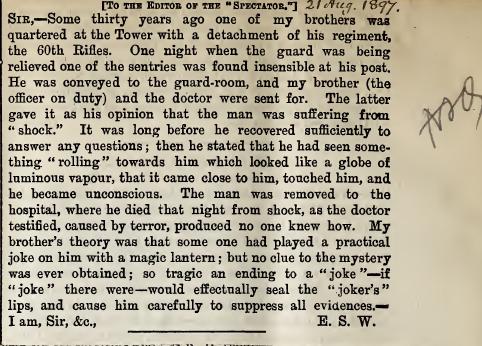The Tower Monster #5: Another Sentry July 19, 2015
Author: Beach Combing | in : Modern , trackbackThis letter appeared in The Spectator, the British magazine, 21 August 1897. As it involves a sentinel at the Tower of London becoming ill on sighting a ghost it seems worth putting in this series.
Some thirty years ago one of my brothers was quartered at the Tower with a detachment of his regiment, the 60th Rifles.
This should be dated then c. 1865. Not just the correspondence but the date itself came after the Notes and Queries flap. The story also bears some relation:
One night when the guard was being relieved one of the sentries was found insensible at his post. He was conveyed to the guard-room, and my brother (the officer on duty) and the doctor were sent for. The latter gave it as his opinion that the man was suffering from ‘shock.’ It was long before he recovered sufficiently to answer any questions; then he stated that he had seen something ‘rolling’ towards him which looked like a globe of luminous vapour, that it came close to him, touched him, and he became unconscious. The man was removed to the hospital, where he died that night from shock, as the doctor testified, caused by terror, produced no one knew how.
The last section of the article gives some consideration to the magic lantern theory. The idea, particularly common in the later nineteenth century, that gangs of magic lantern operators were running around the city and having japes. Of course, in some cases they very well might have been.
My brother’s theory was that some one had played a practical joke on [the sentry] with a magic lantern; but no clue to the mystery was ever obtained; so tragic an ending to a ‘joke’ – if ‘joke’ there were – would effectually seal the ‘joker’s’ lips, and cause him carefully to suppress all evidences.
If it was not for the reference to the brother the obvious thing to do would be to dismiss this as urban legend: Swifte’s story had been sucked into the ether of storytellers. Of course, the letter writer E.S.W. may have included his brother to give credence. Perhaps some imaginative and resourceful reader can find a contemporary news report: drbeachcombing AT yahoo DOT com Given the vagueness of the date Beach has not even tried and if this happened it might anyway have not reached the press. Note that rolling supernatural bogeys are fairly common and the ball above could probably be given a natural explanation: ball lightning etc.
19 July 2015: Sliegel, a friend, sends in a possible source for this story. It seems to be ten years too early, but…
A Ghost in the Tower. The Tower of London was thrown into some confusion on Saturday night, owing to the nervousness of a young recruit. About 12 o’clock the sentry posted at the back of the Jewel house was heard screaming in a frightful manner. Colonel Wyndham, the Keeper of the Jewels, jumped out of bed. Other sentries of the guard ran immediately to the assistance of the man, whom they found nearly paralysed with fear and his firelock on the ground. He was immediately relieved and taken to the guard-house, where he gave the following story:—‘That as St. Paul’s clock was striking 12, a figure approached him, whom he instantly challenged, but receiving no answer he challenged a second time, and so it approached nearer and nearer towards him. It grew in size, until he thought it reached the moon.’ The poor fellow got into such a nervous state the sight of the monster, that it was some time before he recovered. Berkshire Chronicle – Saturday 01 April 1854, 2
Sliegel writes again this time with a reference from 1926. This could be the same sentry: note 60th rifles.
How a sentry, said to have seen Anne Boleyn’s ‘ghost’ in the Tower of London, struck with his bayonet and then swooned, was told by Mr. Walter Bell on Tuesday at Westminster School. The sentry, who belonged to the old 60th Rifles, was picked up unconscious, and, there being little romance in the Army, was court-martialed for being drunk while on duty. Other soldiers, however, said they saw the phantom, and the man was acquitted. Western Gazette – Friday 12 March 1926



